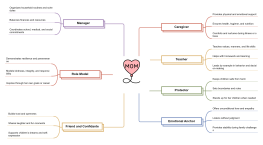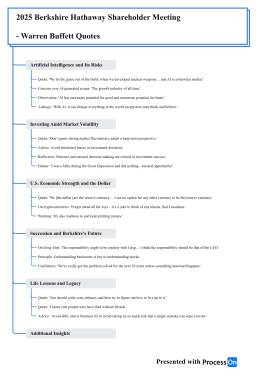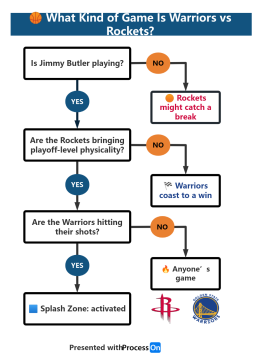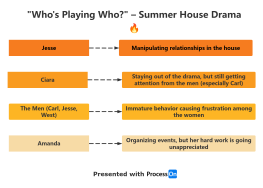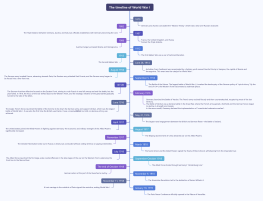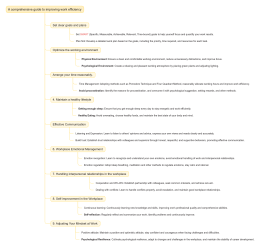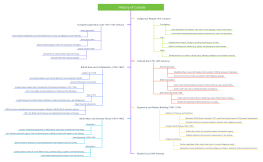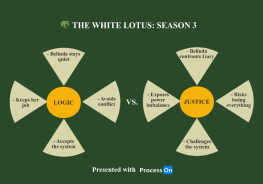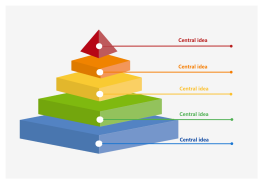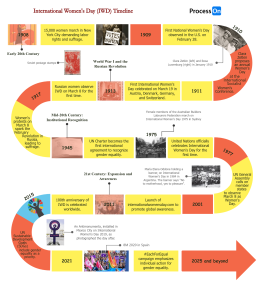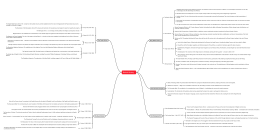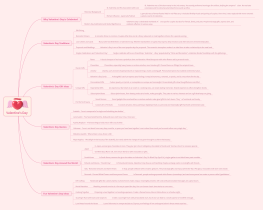3days to understand world history
2024-08-29 13:59:01 170 0 Report 0
0
Login to view full content
This mind map serves as a condensed guide to understanding world history in just three days. It begins with the evolution of humanity, tracing the journey from early hominids like Ramapithecus to Homo sapiens. The content explores two theories of human origin—Monogenesis and Polygenism—highlighting significant archaeological discoveries and evolutionary milestones. It then delves into the rise of civilizations, focusing on the birth of agriculture, city-states, and major ancient civilizations such as Babylon, Egypt, India, and China. Additionally, it covers the development of Eastern and Western ideologies, Greek culture, and significant historical figures like Alexander the Great.
Other creations by the author
Outline/Content
legend
Civilization circle
China, India, the Near East, the Mediterranean
Ancient Babylonian civilization
Sumerians
The place where reeds are lush and thriving
Mesopotamian plain
The Tigris River
The Euphrates River
barrier-free
The rise and fall of city-states
Ethnic exchange, business development
Civilization begins with Sumer.
Cuneiform
Flood legend
Noah's Ark
The Epic of Gilgamesh
temple
The Tower of Babel (The Tower of Heaven)
Tita
The Pyramid
constellation
conquered by Akkad
Akkadians
King Sargon
Amorites
The First Dynasty of Babylon (Ancient Babylonian Kingdom)
King Hammurabi
The Code of Hammurabi
Principle of reciprocity
An eye for an eye, a tooth for a tooth.
Identity Law
aristocrats, commoners, slaves
The rudiments of modern law
has a profound impact
was destroyed by the Hittites
The Assyrian Empire
The Third Dynasty of Babylon
Ancient Egyptian civilization
The Nile River
The lifeline flowing through the desert
Upper and Lower Egypt
Narmer unified the two kingdoms and became a pharaoh.
The capital was established in Memphis, a theocracy.
The religious view of "death and rebirth"
The soul is immortal, it will be reborn in the afterlife.
mummy
Trapezoidal pyramid
pastry
The three great pyramids of Giza
Khufu
The maximum
Harvard Law
The Sphinx
Menkaure
5 periods
before, early, ancient, middle, new
conquered by Alexander the Great
Ptolemaic Dynasty
Ancient Indian civilization
Harappa, Mohenjo-daro two major cities
Excessive deforestation, civilization declines.
The Aryans conquered the indigenous people of India
Caste system
Brahmin (priest)
Kshatriya (nobility and warriors)
Vaishya (commoner)
Shudra (slave)
The Vedas
Indian classic
Ancient Chinese Civilization
Loess Plateau
The westerly wind is affecting.
The Five Emperors, abdication
Xia Dynasty, hereditary
business
Theocracy
Agricultural timing and military affairs were decided by the supreme ruler, who also served as a priest, through divination.
Zhou
The Battle of Muye
Western Zhou Dynasty
Feudal system
The strength of the vassal lords increased, and they moved the capital.
The Spring and Autumn and Warring States periods began
Hittite Kingdom
Small countries unite, later the king centralizes power
Smelting technology
dominate the ironware market
Invaded and destroyed by the mysterious "Sea Peoples"
Assyria
The rule is cruel
Phoenicians
The Canaanites gradually developed into a maritime people.
Monopolizing Mediterranean maritime trade
Carthage (the country established by the Phoenicians in North Africa)
Invented the alphabet
The chosen people of God
The Hebrews settled in Palestine, with a small portion later migrating to Egypt.
Moses, go out of Egypt
In the 11th century BC, the Kingdom of Israel was established with Jerusalem as its capital.
King David and King Solomon, the most powerful.
Divided into the Northern Kingdom of Israel and the Southern Kingdom of Judah.
In the 8th century BC, the Kingdom of Israel was destroyed by the Assyrian Empire.
In 586 BC, the Kingdom of Judah was destroyed by the Neo-Babylonian Empire.
The Captivity of Babylon
The Achaemenid Persian Empire destroyed the Neo-Babylonian Kingdom and emancipated the slaves.
The Bible. Old Testament
The classic of the Jewish people
Yahweh is the only true God.
The end of the world, only Jews can be saved.
is similar to the history of Hebrew
Persian
Achaemenid Empire (Persian First Empire)
Defeat the Medes, New Babylon, and Lydia.
Zoroastrianism
The God of Light and the God of Darkness are in opposition.
The failure of the Greco-Persian Wars
Alexander of Macedonia conquered two countries.
The Aegean civilization
Minoan civilization
Mycenaean civilization
The Greeks absorbed the Minoan civilization and created
Achaeans
The homeland of Greek mythology
The Trojan War
The dawn of European history
New archaeological discovery
The theory of evolution
Ramapithecus, Homo erectus, Late Homo sapiens
4.4 million years ago, 500,000 years ago, 50,000 years ago
two theories
Monogenesis
An African woman - Lucy
Polygenism
Born in Africa, spread across Eurasia
civilization
The birth of agriculture and city-states
The Ice Age ended, warming up.
Agricultural diversification
Worship the god of harvest, with the temple as the center.
wealth gap, class
ape man
Lamida Ape Man
Add猿人
2.5 million years ago
Australopithecus afarensis
human direct ancestors
Lucy
The Four Great Civilizations (Rivers)
Ancient Babylonian civilization
The Two Rivers region
Ancient Egyptian civilization
The Nile River Basin
Ancient Indian civilization
The Indus River Valley
Ancient Chinese civilization
The Yellow River Basin
No large rivers (in America)
Ancient Mexican civilization
Maya civilization
Andean civilization
Inca civilization
Eastern and Western ideological cultures
Athenian democracy
Solon, Pisistratus
Cleisthenes
Citizens' Assembly
The highest authorities of administration, judiciary, and legislation
Ostracism
Women and slaves were excluded.
The Persian Wars
500 BC - 449 BC
Asian Monarchy vs Colonial City-States
Victory of Greece
City-state society disintegrated, the drawbacks of democratic politics expanded.
The battle of the marathon
Darius I
The Battle of Thermopylae
Xerxes II
The land and sea forces launched a pincer attack.
The entire force of the 300 Spartans was annihilated, and the main army retreated.
Athens VS Sparta
Delian League
Collecting over two hundred cities, Athens serves as the alliance leader.
Develop into the Athenian Empire
Pericles' Golden Age
The Peloponnesian League
Centered around Sparta, they fought against Athens.
Group life, military education
The Peloponnesian War
431 BC - 404 BC
Athens surrendered
Weakened the power of Greece, the city-state society faced disintegration.
Macedonia rose to prominence趁势而起
The Battle of Chaeronea resulted in a significant defeat for the combined forces of Athens and Thebes.
In 338 BC, Philip II
Organize the "Corinthian League" and become the leader.
The city-state society is a mere formality.
Greek culture
history
Herodotus
History
Thucydides
The History of the Peloponnesian War
culture
Homer, Hesiod
drama
The three great tragic playwrights and one comic playwright
sculpture
Phidias
The Statue of Athena, the Statue of Zeus
philosophy
Socrates, Plato, Aristotle
Alexander the Great
In 336 BC, Philip II was assassinated and Alexander III succeeded to the throne.
Crusade, dream of establishing a "World Empire"
Alexandria
Spanning Europe, Asia, and Africa
Passed away in 323 BC
The Macedonian Empire was divided into three parts.
Seleucid Empire
Syria
Antigonid dynasty
Macedonia
Ptolemaic Dynasty
Egypt
Hellenistic period
Begins with the expedition to the East, ends with the destruction of the Ptolemaic Dynasty by the Roman Empire.
Greek culture combined with local culture
represents: Gandharan art
Buddhism
Two new religions were born (around 500 BC).
Jainism
Vardhamana (Mahavira)
Deny caste differences, advocate asceticism, non-violence, and abstinence.
Buddhism
Siddhartha Gautama (Sakyamuni)
The prince of the small kingdom of Kapilavastu, part of the Shakya clan.
Under the Bodhi tree on Gaya Mountain, enlightenment was attained.
Transcending caste differences, "all people are born equal"
The Four Noble Truths: suffering, the cause of suffering, the cessation of suffering, and the path to the cessation of suffering.
The Maurya Empire
Ashoka the Great
Kushan Dynasty
Centered around the Gandhara region
Mahayana Buddhism
Bodhisattvas come to save all beings, "together we board the great ship to reach the other shore."
North Transmission
Theravada Buddhism
Value personal enlightenment and relief.
South Transmission
Gandharan art
Buddhism meets ancient Greek culture
Create Buddha statues
Greek culture possesses outstanding sculpting techniques.
The Spring and Autumn and Warring States periods
In 770 BC, the Zhou dynasty moved its capital to Luoyi, known as Eastern Zhou.
770 BC~476 BC, Spring and Autumn period
The Five Hegemons of the Spring and Autumn Period
476 BC~221 BC, Warring States period
The Seven Warring States
A hundred schools of thought contend.
Confucianism, Taoism, Mohism, Yin-Yang, Legalism, Diplomatist, Logician, Agriculturalist, Eclectic, Military strategist
Confucianism
Confucius
benevolent governance
Mencius
Human nature is inherently good.
Xunzi
Human nature is inherently evil.
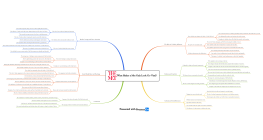
Collect
0 Comments
Next page
Recommended for you
More

